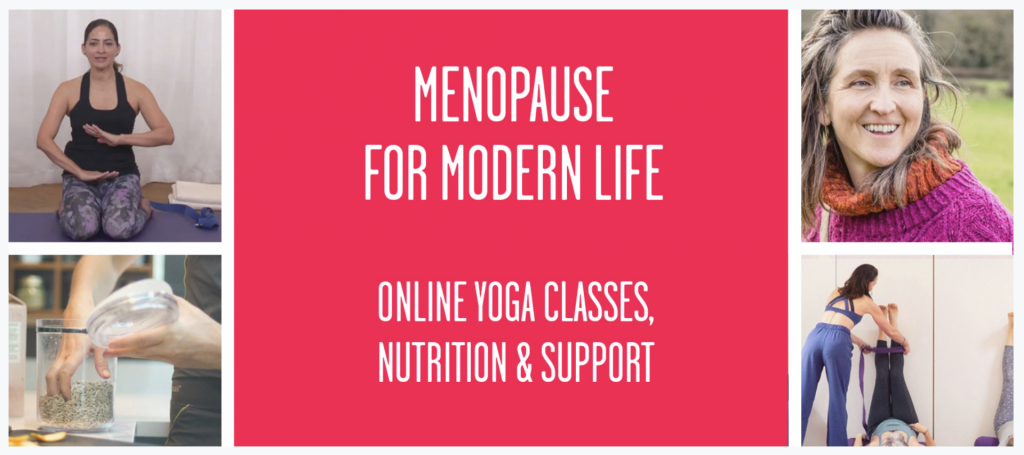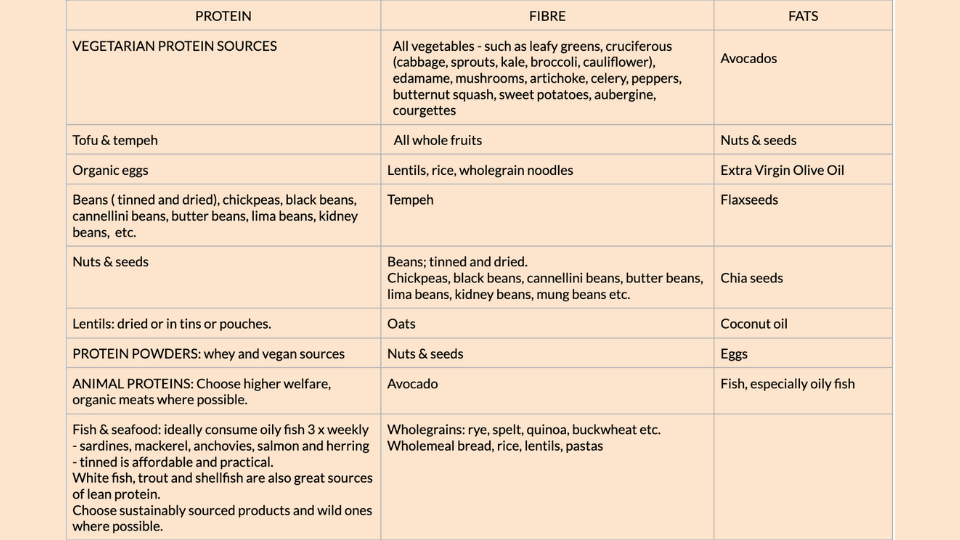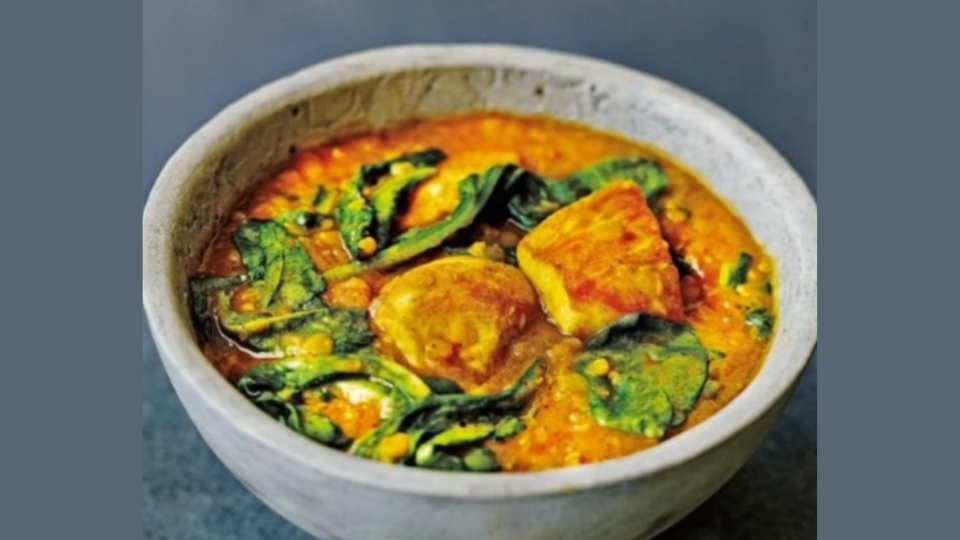
Approaching menopause can be a time that presents challenges – Lindsey Whistler (MA, Nut. Dip.) offers some tools, and nutritional advice, also a delicious LENTIL & TOFU CURRY RECIPE!
Approaching menopause can be a time that presents challenges – shifting hormones cause physical and mental symptoms that can bring about a change of identity and women can often feel invisible and alone. In this article I offer some tools, suggestions, and nutritional support for menopause.
Until recently, the subject of menopause was taboo – thankfully now we are seeing a shift and it has become a hot topic – woman can finally access the knowledge they need to prepare and reframe the shift into something positive.
Menopause is a natural part of ageing, defined as the time at which a woman has not had a period for 12 months – the average age in the UK is 51.
The time preceding this is called Perimenopause and can last from around 4 to 10 years. This is the period when oestrogen levels begin to decline and physical and mental symptoms can be experienced.
Gaining a deeper understanding of the changes your body is undergoing can be empowering and go a long way towards preparing you for what is to come. Please note that this article does not address medically-induced or premature menopause.
How do I know if I am perimenopausal?
Usually, fluctuations in the menstrual cycle are the first tell tale sign. This is where using a tracking app can come in handy – not only can you track your days, but your symptoms too. That information will be extremely useful when trying to advocate for yourself to a health professional.
What can I expect?
Fluctuations can include shorter or longer cycles, skipping a bleed or constant spotting. The symptoms you may experience include, but are not limited to; sleep disturbances, weight gain, chronic fatigue, joint pain, hot flashes, brain fog, mood swings and depression. Please note that if periods become more heavy, frequent or painful, please contact your GP to rule out other conditions.
How can I prepare myself for menopause?
Changes in our metabolism can cause us to react differently – dietary and lifestyle choices that once went unnoticed, can start causing real trouble. Late nights, alcohol, caffeine, a lack of exercise and less-than-ideal food choices – what you got away with in your ‘20s and ‘30s can’t be brushed off. It’s time to start taking proper care of yourself! Keep up your breast and cervical screenings and ensure you have taken advantage of your free NHS Health Check if you live in the UK. Read on to discover how to navigate some of the common changes.
Read more about yoga for stress and anxiety in this complete guide
Health Considerations for Menopausal Women
Bone density peaks at age 30 and gradually declines over time. Between menopause and the age of 60, women are said to lose 25% of bone density. If porous bones or fractures are something your mother or grandmother suffered from, ask for a DEXA scan to understand your status. If you have suffered from anorexia, this will also raise your risk.
Calcium:
Dietary intake of calcium is key – good calcium sources include:
- Dairy
- Fortified non-dairy milks
- Almonds
- Sesame seeds
- Small oily fish such as mackerel and sardines
- Dark green leafy vegetables.
Vitamin D:
Sufficient vitamin D is needed for absorption of calcium – if you can, check your status with the GP before supplementing – however every adult in the UK should be taking at least 10mcg daily between October and April. These Better You vitamin D + K2 sprays are so handy. Keep next to your toothbrush!
Genitourinary Syndrome of Menopause:
The term Genitourinary Syndrome of Menopause is an umbrella term that refers to changes to the vagina, vulva and urinary tract. These symptoms can include vaginal dryness, itching, lowered sexual arousal and orgasm, discomfort during sex and urinary symptoms such as leaking when sneezing, coughing and laughing. Sometimes women may also experience more frequent urinary tract infections. If you are experiencing this, please contact your health professional for personal advice.
You could also try:
- For incontinence: a pelvic floor trainer – Elvie or an app such as Squeezy or try Yoga for Pelvic Floor Health with Gabriella Espinosa
- For vaginal dryness: coconut oil applied after showers to the vulva (not inside the vaginal canal)
- Using it: masturbation and sex have been proven to keep the tissues healthy by promoting natural lubrication. If you would like, use a good lubricant like Coco de Mer Pure Delight Orgasm Balm.

Heart Disease:
Risk of heart disease rises in women after menopause and becomes the leading cause of death among this age group. Lifestyle is key – smoking, lack of physical activity, high blood pressure, high sugar intake, alcohol use and raised cholesterol are all factors that put you at higher risk. Start by getting a Health Check and then gradually start making changes. See the resources box at the end of the article for where to find help.
Weight gain:
Weight gain is a common complaint during perimenopause. There are multiple factors that cause this – a slowing metabolism which is a side effect of ageing rather than menopause itself, raised cortisol and a decline in oestrogen. This decline in ovarian oestrogen causes the body to lay down fat cells which can produce a type of (unfortunately unhelpful) oestrogen.
In order to combat this, it’s wise to make some changes to your diet and exercise regime. Rather than see this as a chore, try shifting your mindset to see this as a massive opportunity to take back control. Making positive changes doesn’t have to mean sacrifices – in fact, you are gifting yourself:
- More energy
- Better sleep
- Positive thinking
- A feeling of accomplishment
- A fitter body that feels good to be in

The Menopause for Modern Life course brings together specialist contributors and offers yoga classes, audio interviews, facts, guidance and community. It is suitable for anyone interested in understanding more about menopause.
Nutritional Support for Menopause
Try a Whole Foods Diet
Adopting a whole foods diet is a great way to reduce your risk of disease, and may ease some of the symptoms related to menopause. Eating a diet that is high in vegetables, legumes, fruits, nuts, seeds and protein will give you the nutrients you need to support your bone and heart health as well as fibre to support the elimination of toxins and hormones.
Protein + Healthy Fat + Fibre
Prioritising PROTEIN + HEALTHY FAT + FIBRE balances your blood sugar, keeping you fuller for longer and thereby aiding weight loss or stability.
See the chart below to understand which foods fall into that category.

Cut down on refined carbohydrates:
Cutting down on refined carbohydrates is a good way to avoid insulin spikes, which in turn cause energy slumps and contribute to weight gain by storing energy as fat. Switch to wholegrains, avoid sugary treats and always eat a source of protein with your carbohydrates.
Introduce phytoestrogen-containing foods:
Introduce 2-3 portions per day of phytoestrogen-containing foods, such as flaxseed, soy beans, tempeh, tofu, chickpeas, lentils, grains, fruits and vegetables. These foods contain isoflavones that mimic oestrogen and can help mitigate some of the menopausal symptoms, especially hot flushes.
Intermittent Fasting:
Intermittent fasting has had a lot of press, however the research has been conducted on men and rodents! This makes it difficult to extrapolate to women and understand any long term benefit. Rather than going long periods without eating, which can cause stress on the body, try to:
- Eat within one hour of waking (ensure a protein-rich breakfast)
- Leave 4 hours between meals where only water is drunk (this activates the motor migratory complex, promoting good gut health)
- Avoid snacking, instead eat 3 good meals a day
- Avoid late-night snacking (if you find that you are hungry after dinner, increase the size of your meals during the day)
Alcohol:
Cut back or remove alcohol completely. Sometimes an unpopular opinion – alcohol is a toxin which becomes increasingly difficult to metabolise as we age. Hangovers becoming worse and worse…? That is no coincidence. Choosing to go sober or mostly dry is an incredibly empowering decision – the benefits are endless – more energy, better skin, weight loss, better sleep, more money, better self esteem, freedom, time, opportunities, being more present for this one and precious life. See the resources box for how to do it!
Exercise for Menopause
The benefits of regular exercise during menopause:
- Boosts your mood
- Improves bone health
- Increases muscle tone
- Reduces stress
- Can prevent future injuries
- Improves joint motion
- Improves cardiovascular health
- Increases self esteem
- Can help you maintain or lose weight.
As you age, consider the type of exercise you do: resistance exercise such as yoga and pilates are fantastic for stress-busting and bringing down cortisol levels while toning and strengthening the body. HIIT exercise is good for cardiovascular fitness and lifting weights is fantastic for cardiovascular health, muscle tone and bone health. Be sure to recover adequately between sessions in order to calm the nervous system response. First and foremost however, the exercise you choose should be something that you enjoy and want to do consistently.
TRY: these wonderful Menopause yoga classes or this strengthening Pilates course on MFML. Also try Menopause Yoga classes with Petra Coveney

Other Suggestions for Menopause Support
MIND
Having support is key for navigating menopause, helping women feel less alone. See the resources box for how to find a group near you.
CBT has been proven to help those dealing with hot flashes, depression, anxiety, sexual problems and trouble sleeping. Speak to your health professional to understand what is available.
Medical Interventions for Menopause
Hormone Replacement Therapy is finally getting the good press it needs – educate yourself on what is available and seek the help of a trusted health professional like your GP, or a specialist doctor.
Herbal Remedies
There is evidence to suggest that among others, black cohosh, panax ginseng, sage and red clover can be beneficial for menopause symptoms.
Because formulations can vary so much, it’s essential to get personalised advice from a professional nutritional therapist or specialist doctor.
Read more in Yoga for Stress and Anxiety: A Complete Guide
OTHER RESOURCES
Books:
- Perimenopause Power by Maisie Hill
- The Female Factor by Dr Hazel Wallace
- The Perimenopause Solution by Emma Bardwell & Dr Shahzadi Harper
- Preparing for the Perimenopause & Menopause by Dr Louise Newsom
Read more about Yoga for Menopause in MFML’s ‘complete guide’
Courses:
Instagram:
- Dr Shahzadi Harper (@drshahzadiharper)
- Kate Rowe-Ham – menopause fitness expert (@katerh_fitness)
- Davina McCall (@davinamccall)
Podcasts:
Support:
- Movement for Modern Life Facebook Page (private page)
- Menopause Matters
- Daisy Network – for those suffering premature menopause
- The Menopause Charity
Stop smoking:
Stop drinking:
- One Year No Beer
- Love Sober
- Alcohol Change – fabulous app that helps you cut down or stop, from the people behind Dry January.
- Dryy app – a great community to help you make new connections, whether you want to stop completely or cut down.
- Club Soda
RECIPE: Tofu Lentil Curry
Ingredients
500g firm tofu (cubed) OR If you eat meat you can substitute the tofu with chicken breast
1 tbsp olive oil
2 red onions, chopped
6 garlic cloves, chopped
400g red or green lentils (green stay firmer)
1.5l vegetable stock
2-3 tbsp curry paste (look for one without sugar – try Free & Easy)
300g baby spinach
Full-fat yoghurt to serve
Preparation
- Heat the oil in a large pan, fry onions and garlic for 2-3 minutes
- Add the tofu and fry for 10 minutes. When the tofu is slightly crispy, remove and place to the side.
- Add the lentils and stock to the remaining onion and garlic
- Simmer for 10 minutes and add the curry paste.
- Stir well and simmer until lentils are cooked through.
- Stir in the tofu and spinach when you are ready to serve
- Add a dollop of yoghurt on the side if you like

Nutrition:
Cholesterol-busting, rich in fibre & iron
Ready in 35 minutes
Serves 6-8
Recipe adapted from Dale Pinnock

Lindsey Whistler MA, Nut. Dip.
Lindsey is a Registered Nutritional Therapist with ANP and also holds an MA from St Andrews University. Lindsey runs her own practice and consultancy in Bath and online.
If you would like any more information please feel free to contact Lindsey for a free 20-minute call. Contact lindsoloves@gmail.com or DM @lindsolovesfood
SPECIAL OFFER: 30% off an initial & follow up appointment with Lindsey when you mention MFML when booking





Leave a Reply